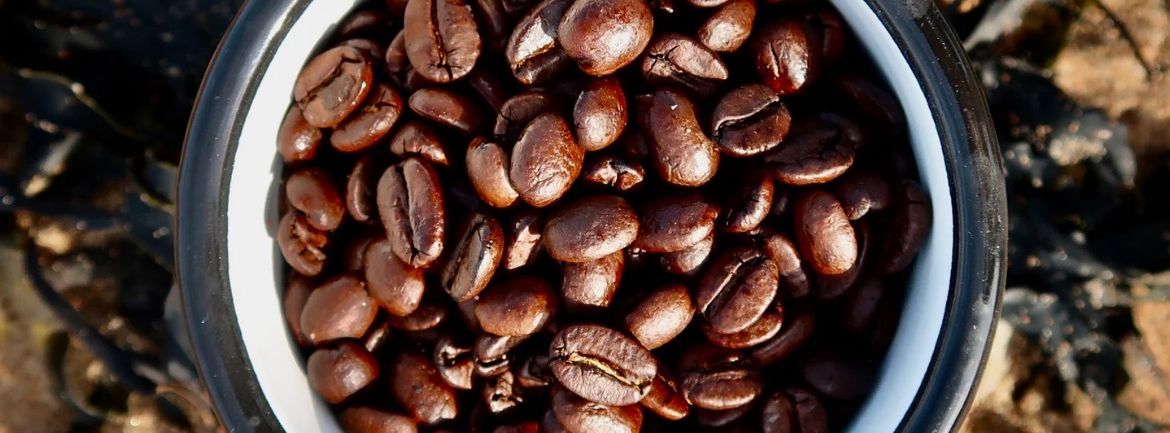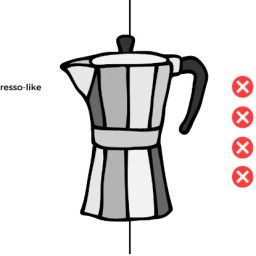
Dark roast coffee, known for its dark brown color and shiny, oily surface, reaches its character through high-temperature roasting. This process typically goes beyond the first crack stage of the beans, developing a richer, darker flavor that many coffee enthusiasts associate with a strong coffee experience.
However, this “strength” isn’t about caffeine—dark roasts actually contain slightly less caffeine than lighter roasts. Instead, the bold, robust flavor profile leads to the common misconception that dark roast coffee is the stronger choice in terms of caffeine content.
Is Dark Roast Coffee Stronger?
When it comes to dark roast coffee, the idea of strength is more about taste than actual caffeine levels. Dark roast coffee is not necessarily stronger in terms of caffeine content compared to lighter roasts. The deep, intense flavor profiles and smokiness of dark roast are often perceived as strength, which is a sensory illusion rather than a factual reality. So if you’re looking for a caffeine boost, the roast level is less important than how much coffee you brew.
Key Takeaways
- Flavor Profile: Dark roast coffee is appreciated for its bolder, smokier flavor. This richness is often mistaken for higher strength or caffeine content.
- Caffeine Levels: Surprisingly, dark roasts generally have slightly lower caffeine content than lighter roasts. This is due to the longer roasting process, which slightly diminishes caffeine levels.
- Perceived Strength: The strength most associate with dark roast is really about the boldness of its flavor. The rich, sometimes bitter flavors can feel more potent, but this does not correlate directly with caffeine.
- Influencing Factors: Several factors influence the strength and flavor of your coffee, including the type of beans, the brewing method, and how long the beans are roasted.
What Determines Coffee’s Strength?
The perceived strength of coffee is influenced by several key factors, beyond just the color of the roast. Understanding these can help you brew the perfect cup that aligns with your strength preferences.
- Roast Level: While dark roast is often perceived as stronger due to its bold flavors, the roast level influences flavor more than actual strength or caffeine content. Lighter roasts can offer a sharper, sometimes more intense taste.
- Brewing Method: The way you make your coffee has a significant impact on its strength. Methods like espresso, which uses a small amount of water relative to the amount of coffee, typically produce a stronger cup than, say, drip coffee methods.
- Coffee-to-Water Ratio: Perhaps the most direct factor in coffee strength, the ratio of coffee to water can drastically alter the intensity of your brew. More coffee per unit of water results in a stronger cup.
Caffeine Content in Dark vs. Light Roast
There’s a common myth that darker roasts have more caffeine, due to their strong flavor and darker appearance. However, the truth is a bit more nuanced.
- Roasting’s Impact on Caffeine: During the roasting process, coffee beans lose water content and mass. The longer and hotter the roast, the more mass is lost. While dark roasts have a more intense flavor, they actually contain slightly less caffeine than lighter roasts because they are roasted longer, which degrades some caffeine.
- Volume vs. Mass: If you measure your coffee by scoops, light roast, being denser, can deliver more caffeine because less of it is lost to the roasting process. However, if you weigh out your coffee, the difference in caffeine content between light and dark roasts is minimal.
Characteristics of Dark Roast Coffee
Dark roast coffee is distinguished by its bold, robust flavor that many coffee lovers cherish. Here’s what sets dark roast apart:
Flavor: The flavors of dark roast coffee are intense and straightforward. Commonly described as smoky or even burnt, dark roasts feature deep, rich chocolatey notes, sometimes with hints of caramel or molasses. Unlike lighter roasts, which might showcase floral or fruity notes, dark roast is all about that classic coffee taste that is both strong and rich.
Aroma: The aroma of dark roast coffee is potent and can fill a room with its smoky, sometimes spicy scent. This powerful aroma is one of the defining characteristics of a good dark roast, evoking a sense of warmth and comfort.
Body: Dark roast coffee is typically heavier or fuller in body compared to lighter roasts. This means it feels thicker on the palate, which contributes to a satisfying, substantial drinking experience. The oils released during the longer roasting process give dark roast its characteristic sheen and contribute to its creamy, smooth texture when brewed.
Typical Uses of Dark Roast Coffee
Dark roast coffee is incredibly versatile but shines particularly in certain preparations:
Espresso: Dark roast is often the go-to choice for espresso due to its strong flavor and heavy body, which stand up well to the intense extraction process of espresso machines. The rich, creamy espresso that results is ideal for coffee drinks like lattes and cappuccinos, where the coffee needs to be robust enough to balance out the milk.
Cold Brew: Its boldness and lower acidity make dark roast an excellent choice for cold brew coffee. The prolonged steeping extracts the deep flavors without the bitterness, resulting in a smooth, rich brew.
FAQs
Does dark roast mean more caffeine?
No, dark roast does not necessarily mean more caffeine. In fact, dark roasts typically have slightly less caffeine than lighter roasts due to the longer roasting process which can degrade some caffeine content.
Can the strength of coffee be adjusted regardless of the roast?
Yes, the strength of coffee can be adjusted regardless of the roast. You can customize the strength of your coffee by changing the coffee-to-water ratio, grinding the coffee more finely or coarsely, or adjusting the brewing time.
How does the brewing method impact the flavor of dark roast?
The brewing method significantly impacts the flavor of dark roast coffee. Methods like espresso, which use high pressure, tend to highlight the rich, bold flavors of dark roast. On the other hand, methods like French press or cold brew allow for a fuller extraction, which can bring out the subtler, smoky notes of the roast without excessive bitterness.
Final Thoughts
We’ve explored various facets of dark roast coffee, clarifying that while it is often perceived as stronger, its actual caffeine content is not necessarily higher than that of lighter roasts. The “strength” associated with dark roast refers more to its bold, rich flavor profile and heavy body, which make it particularly favored for brewing methods like espresso and cold brew.









